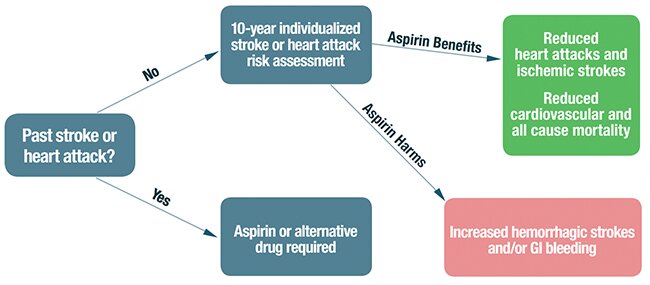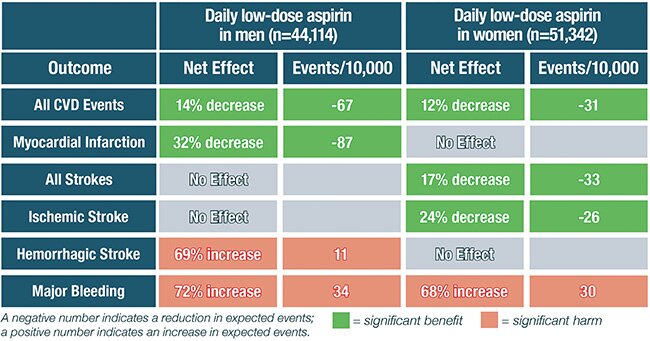Aspirin Benefits & Harms
Aspirin is useful—and sometimes critical—to treat and prevent disease.
Aspirin can save lives, prevent heart attacks and strokes, and even reduce the incidence of cancer. For some patients; however, aspirin may do more harm than good. Read Aspirin and Primary Prevention: Benefits & Harms Fact Sheet (PDF) to learn more.
The U.S. Preventive Services Task Force (USPSTF) recommends prescribing aspirin for prevention if benefits outweigh harms2Do not prescribe aspirin for patients at low risk for cardiovascular events or at high risk for side effects.
Aspirin for prevention: decision-making steps
Assess heart attack and stroke risk and then determine balance of aspirin benefits and harms.

Weigh aspirin benefits against aspirin harms
Aspirin increases risk of serious bleeding in both men and in women—a risk that increases as patients age.3-5
- Risk of hemorrhagic stroke is increased in men6
- Serious GI bleeding increases fourfold when aspirin is given with NSAIDs vs. aspirin alone.5
- Serious bleeding rates are 2-3 times higher in patients taking aspirin with a history of GI ulcers.5
Aspirin prevents cardiovascular disease6
- A review published in the Journal of the American Medical Association analyzed all aspirin trials in patients who never had a heart attack or stroke.
- Endpoints included: heart attacks, ischemic strokes, death, GI bleeding and hemorrhagic strokes.
- Aspirin dose ranged from 100 mg every other day to 500 mg daily.
Results of study analyzing 95,456 individuals over 6.4 years6
- Significant efficacy differences by gender
- Aspirin prevented first heart attacks in men 45 years and older.
- Aspirin prevented first strokes in women 55 years and older.
- Some gender differences in aspirin harms
- 69% increase in risk of hemorrhagic stroke in men
- Likelihood of GI bleeding increased with age in both men and women.

Aspirin’s role in cancer prevention7-9
Evidence strongly suggests aspirin prevents colorectal cancer, lymphoma and other cancer-related deaths, especially in patients who take aspirin for more than 5 years.
- Benefits are independent of age, sex and smoking status.
- Pooled analysis of 20,000 patients showed 24% reduction in the 20-year risk of colorectal cancer.
- Studies show a trend toward a reduced risk of female cancers (e.g., ovarian, cervical and breast cancer).
- Researchers speculate that aspirin inhibits cancer growth by inhibiting COX-2 enzyme.
Aspirin may prevent cognitive decline in women10
- Older women at higher risk of cardiovascular disease may experience slower declines in cognitive function by taking daily aspirin.
- Majority of women had a high risk of cardiovascular disease, based on their risk factors and age.
- Of the 489 women available at the end of the monitoring period, a slower decline in cognition was most pronounced in those who took aspirin for 5 years.

